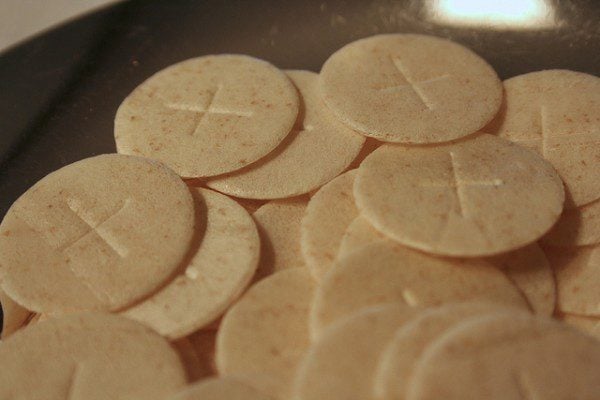
Some Catholics, including those with celiac disease, have been asking for gluten-free Communion hosts. But the Vatican has sent out a letter explaining that this will not be permitted.
According to Roman Catholic theology, the sacrament must employ “valid matter.” Canon law requires the hosts be made of “pure wheat.” Apparently, gluten is to wheat what alcohol is to wine.
Interestingly, canon law also requires Catholics to use unleavened bread, whereas the Eastern Orthodox church uses leavened bread.
Lutherans resisted the move on the part of some Protestants to use grape juice instead of wine for the Sacrament. In my experience, Lutherans use the unleavened hosts that Catholics do. Would the sacrament for Lutherans be just as valid with leavened bread as in Orthodoxy? I suspect so, but I’d be glad to hear from someone who knows. What about gluten-free bread?
The principle, as I recall a pastor explaining, is when the Bible says “wine,” it means “wine.” So that when the Bible says “do this,” referring to “bread,” it would mean “bread.” The issue thus becomes close adherence to the words of Scripture and not just liturgical nicety.
The reasons Catholics insist on bread made out of wheat, as they do, go deep into church history, as the article linked after the jump explains. Some of those reasons would apply to Lutherans and Protestants in general, though some of them would not.
What do you think? Should churches accommodate people with health concerns in the case of gluten, alcohol, or germs from the common cup? Are there ways to do so without changing the apostolic practice?From Joanna M. Pierce, Why the Catholic Church Bans Gluten-Free Communion Wafers | RealClearReligion:
A recent letter from the Vatican reminded the world’s Catholic bishops of a rule mandating the use of wheat gluten for the celebration of the Eucharist, a Christian liturgical service called the Mass by Catholics.
Reactions were immediate. Catholics with celiac disease recounted their experiences in trying to find low-gluten options and even approaching priests before Communion to receive consecrated wine from a separate chalice so there was no chance of cross-contamination. Some narrated how they had even refrained from receiving Communion and decided instead on a “spiritual Communion.”
As a specialist in liturgical studies, I was not really surprised. Today in North America there is an intense concern about the nature of bread used for Communion by Catholics – celiac disease, caused by gluten intolerance, affects at least 1 percent of the global population.
But while the Catholic Church does allow low-gluten breads, the use of gluten-free recipes has been strictly prohibited.
The reasons can be found in historical challenges to Catholic Christian practice.
[Keep reading. . .]
Photo from Awareness Campaign, Flickr, Creative Commons License

















